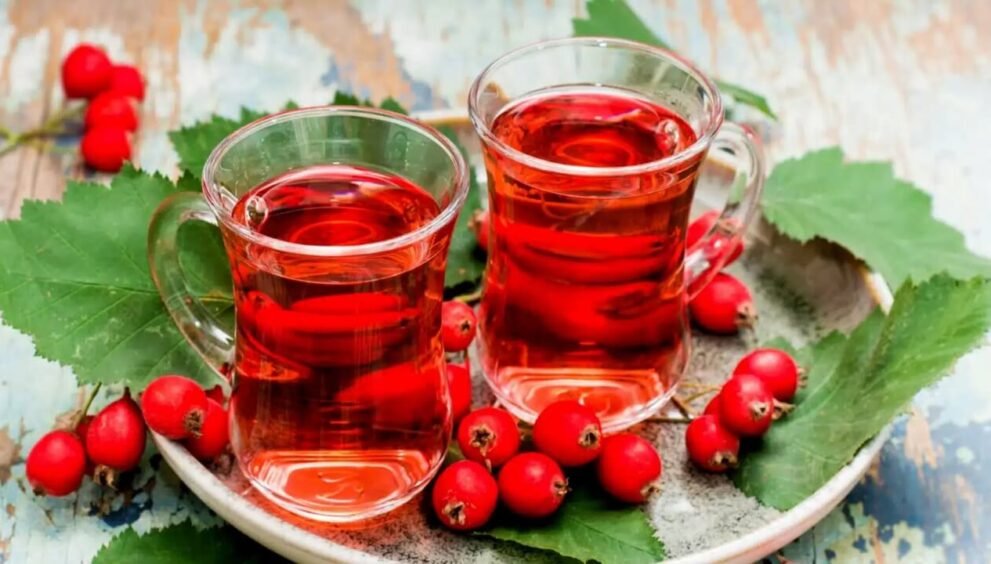Unlocking Heart Health: A Guide to Hawthorn Tea for American Wellness

Have you ever heard whispers of a natural remedy, tucked away in ancient traditions, that could potentially bolster your heart health? Look no further than hawthorn tea. This unassuming beverage, brewed from the berries, leaves, and flowers of the hawthorn plant, is making waves in the wellness community for its potential cardiovascular benefits. Let’s dive into the world of hawthorn tea and discover how it might just be the heart-healthy addition your routine is craving.
What is Hawthorn Tea? A Deep Dive into Its Origins
Hawthorn, scientifically known as Crataegus, is a thorny shrub belonging to the rose family. Native to temperate regions of the Northern Hemisphere, including North America and Europe, hawthorn has been used for centuries in traditional medicine. Historical texts reveal its use in ancient Greece and Rome for various ailments, particularly those related to the heart. Native American tribes also valued hawthorn for its medicinal properties. Now, more and more people are brewing up hawthorn tea.
The hawthorn plant boasts vibrant red berries, delicate white or pink flowers, and distinctive lobed leaves. All three parts – the berries, flowers, and leaves – can be used to create hawthorn tea, although the berries are the most commonly used due to their higher concentration of active compounds. Depending on the variety of hawthorn and the preparation method, the tea can range in color from light pink to deep red, and possesses a slightly tart, subtly sweet flavor with earthy undertones.
The Powerhouse of Bioactive Compounds
What makes hawthorn tea so special? The answer lies in its rich concentration of bioactive compounds. These compounds, including flavonoids, oligomeric proanthocyanidins (OPCs), and phenolic acids, are responsible for the tea’s therapeutic potential.
- Flavonoids: These potent antioxidants help protect cells from damage caused by free radicals, unstable molecules that can contribute to aging and disease. Key flavonoids in hawthorn include hyperoside, rutin, and vitexin.
- Oligomeric Proanthocyanidins (OPCs): OPCs are another class of antioxidants with strong anti-inflammatory properties. They support blood vessel health and improve circulation.
- Phenolic Acids: These compounds also contribute to the tea’s antioxidant and anti-inflammatory effects. Examples include chlorogenic acid and caffeic acid.
These compounds work synergistically to exert their beneficial effects on the cardiovascular system and overall health.
The Potential Benefits of Hawthorn Tea: Heart Health and Beyond
The potential health benefits of hawthorn tea are vast, however, the most research exists for its use in cardiovascular support.
Supporting Heart Health
Hawthorn tea is primarily known for its potential to support heart health. Research suggests that it can:
- Improve Blood Flow: Hawthorn may help dilate blood vessels, allowing blood to flow more freely to the heart and other organs. This can reduce the strain on the heart and improve overall circulation.
- Lower Blood Pressure: Some studies indicate that hawthorn can help lower blood pressure, particularly in individuals with mild to moderate hypertension. The flavonoids and OPCs in hawthorn are believed to contribute to this effect by relaxing blood vessels.
- Strengthen Heart Muscle: Hawthorn may help strengthen the heart muscle and improve its contractility, leading to more efficient pumping of blood throughout the body.
- Reduce Angina Symptoms: Angina, chest pain caused by reduced blood flow to the heart, may be alleviated by hawthorn tea due to its ability to improve blood flow and reduce blood pressure.
Beyond the Heart: Additional Potential Benefits
While hawthorn tea shines in the realm of heart health, it may also offer other potential benefits:
- Antioxidant Protection: The high concentration of antioxidants in hawthorn tea helps protect cells from damage caused by free radicals, potentially reducing the risk of chronic diseases.
- Anti-Inflammatory Effects: Hawthorn’s anti-inflammatory properties may help reduce inflammation throughout the body, potentially benefiting individuals with conditions like arthritis.
- Anxiety Reduction: Some studies suggest that hawthorn may have a calming effect on the nervous system, potentially reducing anxiety and promoting relaxation. Anecdotal evidence from Reddit forums and online wellness communities suggests users find hawthorn tea helpful for mild anxiety.
- Digestive Support: Hawthorn may aid digestion by promoting healthy gut flora and reducing bloating.
Expert Insight:
According to Dr. Stephen Sinatra, a board-certified cardiologist and author,
“Hawthorn is one of the most powerful herbal remedies for supporting heart health. Its unique blend of antioxidants and other compounds can help improve blood flow, lower blood pressure, and strengthen the heart muscle.”
How to Brew the Perfect Cup of Hawthorn Tea
Brewing hawthorn tea is a simple process that can be easily incorporated into your daily routine. Here’s a step-by-step guide:
- Gather Your Ingredients: You’ll need dried hawthorn berries, flowers, or leaves, and filtered water. You can find dried hawthorn at most health food stores or online retailers.
- Heat the Water: Bring filtered water to a boil.
- Prepare the Tea: Place 1-2 teaspoons of dried hawthorn per cup of water into a tea infuser or teapot.
- Steep: Pour the boiling water over the hawthorn and let it steep for 10-15 minutes. The longer the steeping time, the stronger the flavor and the more beneficial compounds will be extracted.
- Strain and Serve: Remove the tea infuser or strain the tea into a cup. You can add honey or lemon to taste, although many people enjoy the tea on its own.
Tips for the Best Hawthorn Tea Experience:
- Use High-Quality Hawthorn: Opt for organic, sustainably sourced hawthorn to ensure the highest quality and potency.
- Adjust Steeping Time to Your Preference: Experiment with different steeping times to find the flavor that suits your palate.
- Drink Regularly: For optimal benefits, aim to drink 1-3 cups of hawthorn tea per day.
- Listen to Your Body: Pay attention to how your body responds to hawthorn tea and adjust your intake accordingly.
Potential Side Effects and Precautions
While hawthorn tea is generally considered safe, it’s important to be aware of potential side effects and precautions.
Common Side Effects:
- Digestive Upset: Some individuals may experience mild digestive upset, such as nausea or stomach cramps, especially when first starting to drink hawthorn tea.
- Dizziness: In rare cases, hawthorn can cause dizziness, particularly in individuals with low blood pressure.
- Skin Rash: Allergic reactions to hawthorn are rare, but possible. Watch for any signs of a skin rash.
Important Precautions:
- Medication Interactions: Hawthorn may interact with certain medications, including blood pressure medications, heart medications, and blood thinners. Therefore, it’s crucial to consult with your doctor before drinking hawthorn tea, especially if you are taking any medications.
- Pregnancy and Breastfeeding: The safety of hawthorn tea during pregnancy and breastfeeding has not been established. It’s best to avoid drinking it during these times unless specifically advised by your healthcare provider.
- Surgery: Hawthorn may affect blood clotting. It’s recommended to stop drinking hawthorn tea at least two weeks before any scheduled surgery.
Reddit Community Insights:
Online forums like Reddit offer a treasure trove of anecdotal experiences. Some users share positive experiences with hawthorn tea for mild anxiety, while others caution about potential interactions with medications. As with any herbal remedy, it’s important to approach these anecdotes with a critical eye and consult with a healthcare professional for personalized advice.
Incorporating Hawthorn Tea into Your Wellness Routine
Hawthorn tea can be a valuable addition to a holistic wellness routine focused on heart health and overall well-being. Here are some tips for incorporating it effectively:
- Start Slowly: Begin with one cup of hawthorn tea per day and gradually increase your intake as tolerated.
- Pair with a Healthy Diet: Combine hawthorn tea with a heart-healthy diet rich in fruits, vegetables, whole grains, and lean protein.
- Engage in Regular Exercise: Regular physical activity, such as brisk walking, jogging, or swimming, can further enhance the cardiovascular benefits of hawthorn tea.
- Manage Stress: Practice stress-reducing techniques like yoga, meditation, or deep breathing exercises to support heart health.
- Get Adequate Sleep: Aim for 7-8 hours of quality sleep per night to promote overall well-being.
- Regular Doctor Visits: Be sure to stay up to date with your checkups with your medical doctor.
Hawthorn Tea Varieties and Where to Find Them
Now that you’re excited to add this tea into your lifestyle, you must learn where to find it. Hawthorn tea is available in various forms, each with its own unique characteristics.
- Loose Leaf: Loose leaf hawthorn tea is often considered the highest quality option, as it allows you to see and smell the ingredients before brewing. You can find loose leaf hawthorn berries, flowers, or leaves at specialty tea shops or online retailers.
- Tea Bags: Hawthorn tea bags are a convenient option for those who prefer a quick and easy brewing process. Look for tea bags that contain only pure hawthorn, without any added flavors or fillers.
- Tinctures: Hawthorn tinctures are concentrated liquid extracts that can be added to water or juice. Tinctures offer a potent dose of hawthorn’s active compounds.
- Capsules: Hawthorn capsules contain powdered hawthorn and are a convenient way to take hawthorn supplements.
When choosing hawthorn tea, look for reputable brands that use high-quality, organic ingredients. Read the labels carefully to ensure that you are getting pure hawthorn, without any unnecessary additives.
You can find hawthorn tea at most health food stores, natural grocers, and online retailers. Some popular brands include Traditional Medicinals, Gaia Herbs, and Yogi Tea.
Conclusion: Embrace the Heart-Healthy Power of Hawthorn Tea
Hawthorn tea offers a natural and potentially effective way to support heart health and overall well-being. Its rich concentration of antioxidants and other beneficial compounds may help improve blood flow, lower blood pressure, strengthen the heart muscle, and reduce inflammation. While hawthorn tea is generally considered safe, it’s important to be aware of potential side effects and precautions, and to consult with your doctor before drinking it, especially if you are taking any medications.
By incorporating hawthorn tea into a holistic wellness routine that includes a healthy diet, regular exercise, stress management, and adequate sleep, you can harness its heart-healthy power and enjoy its potential benefits for years to come. So, why not brew yourself a cup of hawthorn tea and embark on a journey towards a healthier, happier heart? You can discover for yourself the benefits of hawthorn tea.
Sweet Truth: Unveiling the tsp Sugar Calories and Their Impact on Your Health








































































































































































































































































































































































































































































































